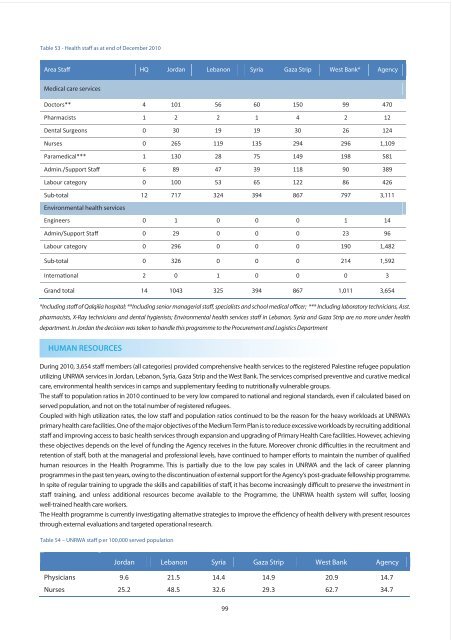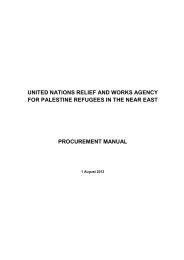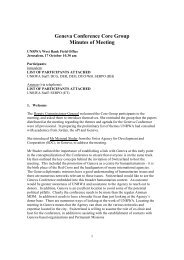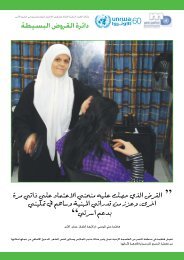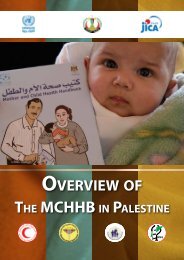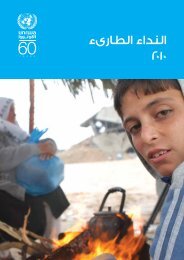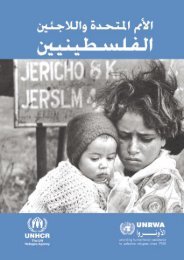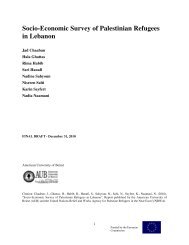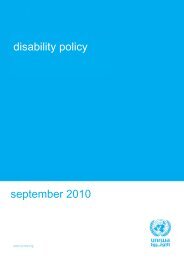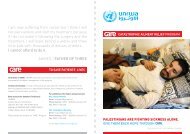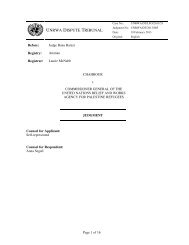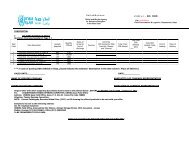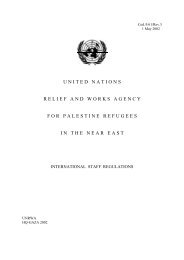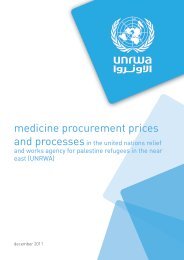Annual Report of the Department of Health 2010 - Unrwa
Annual Report of the Department of Health 2010 - Unrwa
Annual Report of the Department of Health 2010 - Unrwa
You also want an ePaper? Increase the reach of your titles
YUMPU automatically turns print PDFs into web optimized ePapers that Google loves.
Table 53 - <strong>Health</strong> staff as at end <strong>of</strong> December <strong>2010</strong><br />
Area Staff HQ Jordan Lebanon Syria Gaza Strip West Bank* Agency<br />
Medical care services<br />
Doctors** 4 101 56 60 150 99 470<br />
Pharmacists 1 2 2 1 4 2 12<br />
Dental Surgeons 0 30 19 19 30 26 124<br />
Nurses 0 265 119 135 294 296 1,109<br />
Paramedical*** 1 130 28 75 149 198 581<br />
Admin./Support Sta 6 89 47 39 118 90 389<br />
Labour category 0 100 53 65 122 86 426<br />
Sub-total 12 717 324 394 867 797 3,111<br />
Environmental health services<br />
Engineers 0 1 0 0 0 1 14<br />
Admin/Support Sta 0 29 0 0 0 23 96<br />
Labour category 0 296 0 0 0 190 1,482<br />
Sub-total 0 326 0 0 0 214 1,592<br />
Internaonal 2 0 1 0 0 0 3<br />
Grand total 14 1043 325 394 867 1,011 3,654<br />
*Including staff <strong>of</strong> Qalqilia hospital; **Including senior managerial staff, specialists and school medical <strong>of</strong>ficer; *** Including laboratory technicians, Asst.<br />
pharmacists, X-Ray technicians and dental hygienists; Environmental health services staff in Lebanon, Syria and Gaza Strip are no more under health<br />
department. In Jordan <strong>the</strong> decision was taken to handle this programme to <strong>the</strong> Procurement and Logistics <strong>Department</strong><br />
HUMAN RESOURCES<br />
During <strong>2010</strong>, 3,654 staff members (all categories) provided comprehensive health services to <strong>the</strong> registered Palestine refugee population<br />
utilizing UNRWA services in Jordan, Lebanon, Syria, Gaza Strip and <strong>the</strong> West Bank. The services comprised preventive and curative medical<br />
care, environmental health services in camps and supplementary feeding to nutritionally vulnerable groups.<br />
The staff to population ratios in <strong>2010</strong> continued to be very low compared to national and regional standards, even if calculated based on<br />
served population, and not on <strong>the</strong> total number <strong>of</strong> registered refugees.<br />
Coupled with high utilization rates, <strong>the</strong> low staff and population ratios continued to be <strong>the</strong> reason for <strong>the</strong> heavy workloads at UNRWA’s<br />
primary health care facilities. One <strong>of</strong> <strong>the</strong> major objectives <strong>of</strong> <strong>the</strong> Medium Term Plan is to reduce excessive workloads by recruiting additional<br />
staff and improving access to basic health services through expansion and upgrading <strong>of</strong> Primary <strong>Health</strong> Care facilities. However, achieving<br />
<strong>the</strong>se objectives depends on <strong>the</strong> level <strong>of</strong> funding <strong>the</strong> Agency receives in <strong>the</strong> future. Moreover chronic difficulties in <strong>the</strong> recruitment and<br />
retention <strong>of</strong> staff, both at <strong>the</strong> managerial and pr<strong>of</strong>essional levels, have continued to hamper efforts to maintain <strong>the</strong> number <strong>of</strong> qualified<br />
human resources in <strong>the</strong> <strong>Health</strong> Programme. This is partially due to <strong>the</strong> low pay scales in UNRWA and <strong>the</strong> lack <strong>of</strong> career planning<br />
programmes in <strong>the</strong> past ten years, owing to <strong>the</strong> discontinuation <strong>of</strong> external support for <strong>the</strong> Agency’s post-graduate fellowship programme.<br />
In spite <strong>of</strong> regular training to upgrade <strong>the</strong> skills and capabilities <strong>of</strong> staff, it has become increasingly difficult to preserve <strong>the</strong> investment in<br />
staff training, and unless additional resources become available to <strong>the</strong> Programme, <strong>the</strong> UNRWA health system will suffer, loosing<br />
well-trained health care workers.<br />
The <strong>Health</strong> programme is currently investigating alternative strategies to improve <strong>the</strong> efficiency <strong>of</strong> health delivery with present resources<br />
through external evaluations and targeted operational research.<br />
Table 54 – UNRWA staff p er 100,000 served population<br />
Jordan Lebanon Syria Gaza Strip West Bank Agency<br />
Physicians 9.6 21.5 14.4 14.9 20.9 14.7<br />
Nurses 25.2 48.5 32.6 29.3 62.7 34.7<br />
99


